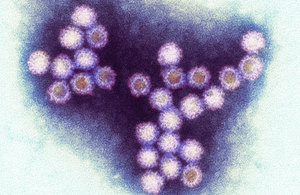Hospitals already seeing outbreaks of norovirus causing ward closures warns Public Health England
PHE advises people with symptoms of norovirus not to visit hospitals this winter and to telephone NHS 111 for advice.

Norovirus
New figures from Public Health England (PHE) reveal the winter norovirus season may be here as there were 18 outbreaks of norovirus in hospitals reported across England in October, 17 of which led to ward closures.
The latest PHE annual data which covers the period July 2013 to June 2014 show a total of 610 outbreaks reported in hospitals of which 571 (94%) led to ward closures. Closures are necessary to help stop transmission of this highly contagious virus around the hospital, but are themselves highly disruptive.
So ahead of the ‘winter vomiting season’ PHE wants to remind everyone experiencing symptoms to stay at home and to telephone NHS 111 for advice. It is vital that people who may have norovirus do not visit hospitals or their GP surgery.
Typical symptoms of a norovirus infection include:
- the sudden onset of projectile vomiting
- watery diarrhoea
- some people also experience headaches, mild temperature and stomach cramps
There is no treatment for the virus but it is important to keep hydrated to combat the loss of fluids. Most people will recover within a few days and there are no long-term effects.
John Harris, an expert in norovirus at PHE said:
October usually marks the start of the norovirus season and the bulk of cases will occur between now and April next year. No 2 norovirus seasons are the same and there is no way of predicting how busy a season will be. What we do know is that many people will be affected across the country and they will probably feel very unwell for a couple of days but will get better. For patients already ill in hospital, this virus could cause further health complications, making it vital to prevent introducing the virus into the hospital environment. We strongly urge anyone affected to stay at home and to telephone NHS 111 for advice.
Norovirus is highly contagious and spreads rapidly in closed environments such as hospitals, schools and care homes. It can be spread through contact with an infected person; by contact with contaminated surfaces or objects or by consuming contaminated food or water.
Ends
Notes to editors
- Read the Stop norovirus spreading this winter: leaflet
- Further advice on norovirus can be found from NHS Choices
- Read the latest norovirus report
- Public Health England exists to protect and improve the nation’s health and wellbeing, and reduce health inequalities. It does this through world-class science, knowledge and intelligence, advocacy, partnerships and the delivery of specialist public health services. PHE is an operationally autonomous executive agency of the Department of Health. @PHE_uk, Facebook: www.facebook.com/PublicHealthEngland